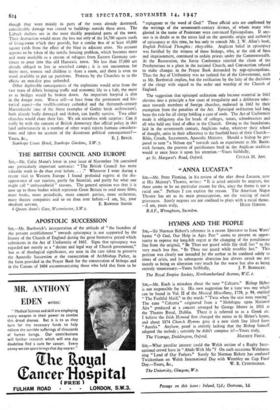APOSTOLIC SUCCESSION
Borthwick's interpretation of the attitude of " the founders of the present establishment " towards episcopacy is not supported by the history of the Church of England during the great formative period which culminates in the Act of Uniformity of 1662. Signs that episcopacy was regarded not merely as a " decent and legal way of Church government," but as of theological significance, are seen in the care taken to preserve the Apostolic Succession at the consecration of Archbishop Parker, in the form provided in the Prayer Book for the consecration of bishops and in the Canons of 1604 excommunicating those who held that form to be " replignant to the word of God." These official acts are confirmed by the writings of the seventeenth-century divines, of whom many who gloried in the name of Protestant were convinced Episcopalians. If any- one is in doubt as to the stress laid on the apostolic origin and authority of episcopacy at this time, he has only to consult Mr. J. W. Allen's book, English Political Thoughts : 1603-1660. Anglican belief in episcopacy was fortified by the witness of those bishops, who, at the risk, of fines and imprisonment, continued to ordain priests under the Commonwealth. At the Restoration, the Savoy Conference rejected the claim of the Presbyterians to a place in the national Church, and Convocation refused to make changes in the Prayer Book demanded by non-episcopalians. Thus the Act of Uniformity was no isolated fiat of the Government, such as Mr. Borthwick implies, but the ratification by the laity of the decisions of the clergy with regard to the order and worship of the Church of England.
The suggestion that episcopal ordination only became essential in 1662 elevates into a principle a few cases of irregularity and a deliberate toler- ance towards members of foreign churches, endorsed in 1662 by their exemption from the penalties of the Act. Episcopal ordination had long been the rule for all clergy holding a cure of souls. The Act of Uniformity made it obligatory also for heads of colleges, tutors, schoolmasters and all who held any kind of office in the Church. Owing to the foundations laid in the seventeenth century, Anglicans today, whatever their school of thought, unite in their adherence to the fourfold basis of their Church— Bible, Creeds, Sacraments, Apostolic Ministry. Should a bishop be pre- pared to turn " a Nelson eye " towards such an experiment as Mr. Borth- wick favours, the protests of parishioners bred in the Anglican tradition would at once force it upon his attention.—Yours faithfully,






























 Previous page
Previous page